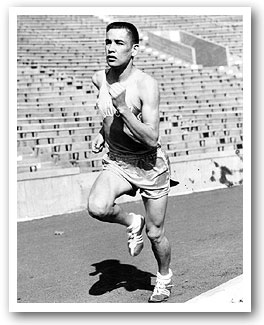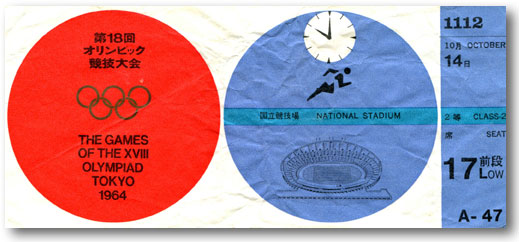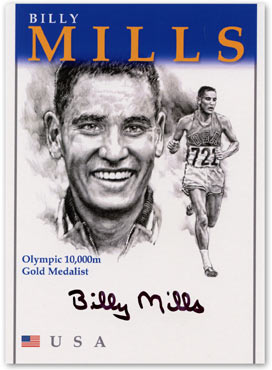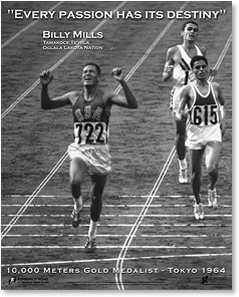|
|
|
|
|
|
|
|
|
|
|
|
|
|
|
|
|
|
|
|
|
|
Profiles Billy Mills was born on June 30, 1938 in Pine Ridge, South Dakota. He is an Oglala Lakota (Sioux) Indian and he was raised on the Pine Ridge Indian Reservation. Billy's given Lakota name is Makata Taka Hela which means "love your country" or more traditionally translated, "respects the earth". Billy grew up
in poverty and was orphaned at the age of 12. He turned to sports
as a positive focus in his life and took up running while attending
the Haskell Institute, an Indian boarding school in Lawrence, Kansas.
Billy discovered that he had a talent for distance running and he
After graduation Billy was commissioned as a lieutenant in the United States Marine Corps. He focused on military life and did not train for a brief period, but soon he returned to running and posted times good enough to qualify for the 1964 Olympics. After training for 18 months Billy made the U.S. Olympic Track and Field Team in the 10,000 meters and the marathon. The 1964 Tokyo Olympic Games No American had ever won the 10,000 meter race in an Olympics. Billy Mills' qualifying time was almost a full minute slower than the favorite's, Ron Clarke of Australia. The pre-race media coverage focused on Clarke and his expected duel with Mohammad Gammoudi of Tunisia. Billy went largely un-noticed. The field for 10,000 meter the final included many Olympic gold medalists and world record holders.
From our favorite book on running history, Fast Tracks - The History of Distance Running by Raymond Krise and Bill Squires, comes this description of the 1964 Olympic 10,000 Meter Final:
Billy set the Olympic 10K record at 28:24.4, almost 50 seconds faster than his previous best time. Mills also competed in the 1964 Olympic marathon and placed 14th. To date, no other American has won a gold medal in the 10,000 meters. Post Olympic Career In 1965 he set U.S. records for the 10,000 meters and the three mile, and he set a world record in the six mile run at the AAU championships. Mills finished
his career in the U.S. Marine Corps as an officer assigned to the
Department of the Interior. He later became a successful life insurance
salesman, then switched careers to become a professional speaker. Billy has served on the President's Council on Physical Fitness and Sports and was named one of the Ten Outstanding Young Americans by the Jaycees in 1972. He was selected as a 1990 Healthy American Fitness Leader and was a recipient of the 1993 Distinguished Service Citation, the highest award given by the University of Kansas and it's Alumni Association. He was inducted into the United States Olympic Hall of Fame in 1984, and is a member of the United States Track and Field Hall of Fame, the National Distance Running Hall of Fame, the Kansas Hall of Fame, the San Diego Hall of Fame, and the National High School Hall of Fame. His life story was made into the film, Running Brave, starring Robby Benson and produced by Englander Productions in 1983. Current Activities Billy Mills
remains active in Native American causes today. He uses his speaking
skills as an advocate for and a role model to young Native Americans.
He is the national spokesman for Running
Strong for American Indian Youth®,
a non-profit organization that help communities with self-sufficiency
programs, youth activities and cultural identity projects. As the
national spokesman for Christian Relief Services, he has helped
raise more than $212 million in contributions. In 1991, Billy wrote Wokini: A Lakota Journey to Happiness and Understanding with Nicholas Sparks, now in it's fourth printing. He and his wife Patricia live in Sacramento, California, where Mills owns and operates Billy Mills Speakers Bureau. |
||
|
Quotes by Billy Mills "Every passion has its destiny" - "My life
is a gift to me from my Creator. - "What I took from the Olympic Games was not winning an Olympic gold medal but an understanding of global unity through dignity of character and pride of global diversity. And global unity through global diversity is also the future of mankind." - "The
ultimate is not to win, but to reach within the depths of your
capabilities and to compete against yourself to the greatest extent
possible. When you do that, you have dignity. You have the pride.
You can walk about with character and pride no matter in what
place you happen to finish." - "I was constantly told and challenged to live my life as a warrior. As a warrior, you assume responsibility for yourself. The warrior humbles himself. And the warrior learns the power of giving." - "God
has given me the ability. The rest is up to me. - From Billy Mills' book, "Wokini" (New Life)
And yet I changed despite myself and believed in Iktumi's lies. He seemed to know all the truth, he promised to make me happy. He made me ask Wakantanka for wealth, that I might have power; I was given poverty, that I might find my inner strength. I asked for fame, so others would know me; I was given obscurity, that I might know myself. I asked for a person to love that I might never be alone, I was given a life of a hermit, that I might learn to accept myself. I asked for power, that I might achieve, I was given weakness, that I might learn to obey. I asked for health, that I might lead a long life. I was given infirmity, that I might appreciate each minute. I asked Mother Earth for strength, that I might have my way, I was given weakness, that I might feel the need for Her. I asked to live happily, that I might enjoy life, I was given life, that I might live happily, I received nothing I asked for, yet all my wishes came true. Despite myself and Iktumi, my dreams were fulfilled, I am richly blessed more than I ever hoped, I
thank-you, Wakantanka, for what you've given me. Other Profiles: Johnny J. Kelley (The Younger) Marathon Artist
|
RP
News | Articles | Trivia
| Profiles | Vintage
Video | Vintage Photos | Contact
Us | Site Map | Home
Cards | Posters
| Autographs | Books
| Pins | Prints
| Authentics | Sportscasters
| How to Order
©
Running Past LLC All Rights Reserved mail@runningpast.com





